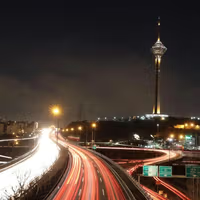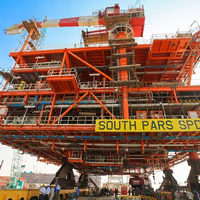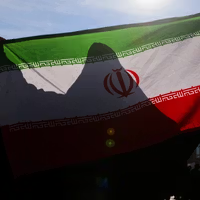Gasoline Consumption Hits Record In Iran Amid Shortages

Iran is facing record gasoline consumption, sparking fears of rationing as the country battles continued shortages.

Iran is facing record gasoline consumption, sparking fears of rationing as the country battles continued shortages.
Jafar Salari-Nasab, the CEO of the National Iranian Oil Refining and Distribution Company (NIORDC), stated, "On Saturday, 130 million liters of gasoline were distributed in the country, which shows an 18 percent increase compared to the same period last year, which was 110.1 million liters."
New year festivities exacerbated the situation as Iranians traveled during the festive season. He added, "On average, from the beginning of Norouz [March 20] until now, 121.7 million liters of gasoline have been consumed in the country daily, showing an increase of 6.2 percent, equivalent to 7.2 million liters, compared to the same period last year, which was 114.5 million liters."
Concerns regarding the rising consumption have prompted the National Iranian Oil Refining and Distribution Company to issue a warning, urging citizens to manage fuel consumption and observe optimization measures.
Jalel Salari, CEO of the National Iranian Oil Refining and Distribution Company, emphasized the inefficiency of domestically produced vehicles, citing their high fuel consumption compared to international standards. He attributed Iran's gasoline deficit to the annual increase of two million vehicles, contributing an additional five to six million liters to daily consumption.
Furthermore, the imbalance in Iran's refining process, where one-third of products are transformed into mazut and bitumen, exacerbates the shortage of petrol. Official statistics reveal that gasoline constitutes only 28 percent of Iran's refinery products, highlighting the need for modernization akin to refineries in other neighboring countries like the UAE.
Amidst the escalating gasoline deficit, the government has resorted to limited imports of mazut substitutes. However, criticisms have been leveled against the current administration led by President Ebrahim Raisi for a lack of transparency in reporting the volume of gasoline imports.

An Islamic Revolutionary Guards' news agency is criticizing a court ruling in Iran that invoked the Sharia principle of retaliation in the case of a police officer who killed a protester.
The court case involves the police commander of Bandar Anzali, Jafar Javanmardi, who was unprecedentedly prosecuted for the killing of 27-year-old protester Mehran Samak.
Samak was fatally shot on November 29, 2022, during nationwide protests that coincided with celebrations over Iran's national football team's defeat by the US team. Reports suggest that Samak was participating in the protests by honking his car horn when he was shot in the head by agents of the regime in Bandar Anzali, located in northern Iran.
According to Samak’s family lawyer, the military court in the city of Qazvin reaffirmed what is known as a “Qissas” verdict against Javanmardi.
In the Islamic courts in Iran, "Qissas" is the principle of retributive justice under Sharia law, matching punishment to the severity of the crime, particularly in cases of homicide or bodily harm.
In this case, Javanmardi would have to be put to death after the latest military court ruling.
However, the IRGC-run Fars News Agency, expressed concerns about the ruling, claiming that given the circumstances of the incident, “occurring amidst a police operation and amid riots,” such a verdict could “undermine police effectiveness.”
Moreover, the news agency did affirm that Javanmardi was responsible for Samak's death due to what they described as "reckless bullet firing".
Fars further asserted, without citing specific sources, that judicial authorities have deemed the verdict against the defendant as "not final" and due to "numerous flaws," the case is slated for review.
The case of Samak's killing stands out as one of the very rare instances where a protester's death has led to the arrest and trial of a security-police official of the Islamic Republic.
While the protests claimed the lives of over five hundred demonstrators at the hands of Islamic Republic security forces, the regime has yet to be held accountable for such deaths.
Conversely, the government has executed several detained protesters on charges of killing security forces, highlighting a stark contrast in treatment.

Iran’s Defense Minister claims that Iran is boosting the security on eastern borders with the deployment of advanced cameras, helicopters, and drones amid security threats from terror group ISIS.
Speaking to state news agency ISNA, Mohammad-Reza Ashtiani said, “In this plan, it's not just about building walls; rather, in border regions, we have various programs that include creating obstacles, using modern equipment and advanced cameras, helicopters, drones, UAVs, and telecommunications and armaments facilities. Equipment and training for border forces are also important, and all of these together ensure the security of the borders.”
Iran faces significant security concerns, particularly along its border with Afghanistan, stemming from the presence and activities of terrorist groups like ISIS. The porous nature of the Afghan border, combined with the ongoing instability and conflict in Afghanistan, poses a direct threat to Iran.
ISIS, in particular, has been a major concern. The extremist ideology and violent tactics employed by ISIS militants have raised fears of potential infiltration into Iranian territory and the spread of radicalization among vulnerable populations, including Afghan refugees residing in Iran.
Iran has experienced sporadic incidents of violence and terrorist attacks attributed to ISIS such as a double bombing in January in Kerman which killed around 100 people.
Iran's fear of ISIS along its Afghan border reflects the broader security concerns it faces in a volatile region. However, Iran itself has been accused of providing support to groups such as Hezbollah in Lebanon, Hamas in Gaza, and certain factions within Iraq and Yemen.

An Israeli airstrike targeting Iran's consulate building close to its embassy in Damascus killed a senior Revolutionary Guard commander and multiple Iranian officials on Monday.
A security source revealed to Reuters that the strike resulted in the death of Mohammad Reza Zahedi, a senior leader of Iran's Revolutionary Guard Corps (IRGC) Quds Force. Additionally, Iran's Arabic language Al Alam TV reported the complete destruction of the Iranian consulate building in Syria.
According to follow-up reports, General Mohammad-Hadi Haji-Rahimi, a deputy of Quds Force general Zahedi, was also killed in the strike.
The Iranian ambassador to Syria, Hossein Akbari, who was not injured, said at least five people had been killed in the attack and that Tehran's response would be "harsh".
Later on Monday, the IRGC in an official statement confirmed the deaths of Zahedi and Haji-Rahimi, as well as five other officers identified as Hossein Amanollahi (earlier identified as Amirollah), Mehdi Jalalati, Mohsen Sedaghat, Ali Agha-Babaei, and Ali Salehi Rouzbahani.
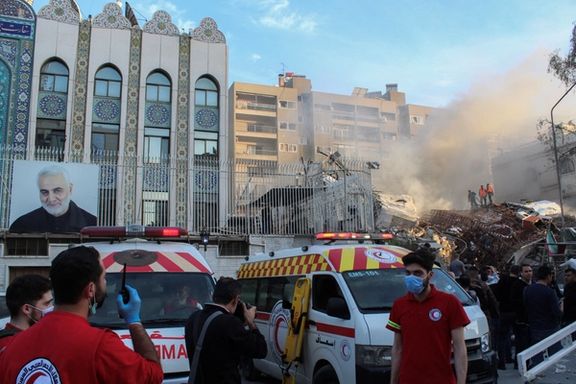
Syria's SANA state news agency confirmed significant destruction to a building in the Mezzeh neighborhood, with neighboring structures also affected.
Reuters reporters at the site in the Mezzeh district of Damascus saw emergency workers clambering atop rubble of a destroyed building inside the diplomatic compound, adjacent to the main embassy building. Emergency vehicles were parked outside. An Iranian flag hung from a pole in front of the debris.
The Syrian foreign minister and interior minister were both spotted at the scene.
Israel, which has repeatedly hit Iranian targets during the six-month war in Gaza, declined to comment on the incident, following its usual practice, Reuters reported. An Israeli military spokesperson said: "We do not comment on reports in the foreign media."
Israel's recent airstrikes have intensified in the wake of Iran-backed Hamas's invasion of Israel on October 7, with a focus on targeting senior Iranian personnel and bases associated with Iran's IRGC. Several militia forces in Syria have come under fire and Zahedi is the latest commander targeted in a series of assassinations this year alone.
Iranian state television said several Iranian "diplomats" had been killed. Iran's Tasnim news agency said five people were killed in the Israeli strike. Syria's SANA state news agency reported an unspecified number of deaths and injuries.
Iran's involvement in the Syrian civil war, which began over a decade ago in support of President Bashar al-Assad's regime has been a source of contention with Israel. Viewing the presence of Iranian forces in Syria as a direct threat, Israel has consistently targeted their bases and weapons concentrations since 2017.
An Israeli military spokesperson said: "We do not comment on reports in the foreign media."

Iran International television journalist and host Pouria Zeraati who was stabbed last week in London posted a message on social media saying the attack was "purposefully planned."
Citing information from the police, Zeraati said that the investigation has made good progress and the investigation was still ongoing. He added that "The suspects had purposefully planned this attack and did/do not pose a threat to the public living in London/UK."
He also thanked thousands of people who have expressed outrage for the attack and expressed support an sympathy for him.
"Firstly I want to thank you for all your calls, messages and support; I am really sorry that I am not able to respond to all of them. The amount of your sympathy, kindness and love in past few days has been and is the greatest and best energy for my recovery process," Zeraati posted on social media on Monday.
"Fortunately, I am feeling better, recovering & I have been discharged from the hospital. My wife and I are residing at a safe place under the supervision of the Met Police," he added
Zeraati was stabbed as he emerged from his home on March 29 in south London by unknown assailants. Iran International has faced threats from the Iranian government for the past 20 months, and other journalists at the network faced imminent threats of attacks in 2022 and 2023.
Although the police have not issued a statement about who the assailants were, Iran's Islamic regime has conducted hundreds of attacks against dissidents and journalists outside the country over the past 45 years.
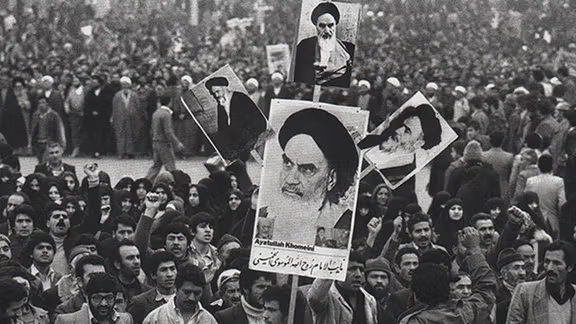
Forty-five years ago, on March 30, 1979, Ayatollah Ruhollah Khomeini led a referendum with a single question: “Do you want an Islamic Republic?”.
During the referendum days, I was a 19-year-old youth serving as a poll worker at a rural polling station near Shiraz. The Islamic Republic’s regime has been the subject of my constant study from that point onwards.
On March 30th and 31st, 1979, villagers showed up at the polls enthusiastically wishing the new regime would pay attention to their demands and problems. Most of them had believed the promises of the new leaders with unwavering simplicity. In that village, the voting result fell approximately 5% below the final national tally – with a dozen blank ballots and votes cast for Iranian singing divas Googoosh and Hayedeh. Invalid votes were an occurrence that started from the very first election conducted under the Islamic Republic’s regime.
Today, the young generation that has experienced the Islamist regime’s policies first-hand have five questions in regards to the 1979 referendum. And, they have the right to question the 1979 generation’s actions – and they deserve answers based on facts on the ground, documents, and memoires.
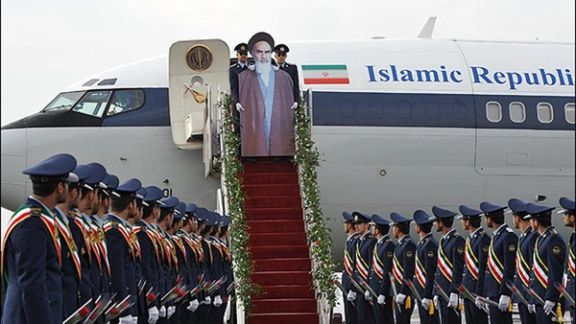
Here are some of the new generation’s questions:
1. Are the results of that referendum reliable?
The reported 97% "yes" vote from 99% of Iranian voters in the referendum couldn't be verified, because independent and international observers were not invited to monitor it and there was no transparency.
It is a fact that a significant number of people participated in that referendum; however, giving a firm opinion about the percentage is impossible, much like in all types of elections in the Islamic Republic.
It is also a fact that Khomeini deceived the Iranian people about the future of their country by posing the question of whether they wanted an Islamic Republic (“yes” or “no”) with maximum ambiguity. This is because he simultaneously advocated for the totalitarian system of the Guardian Jurist (Supreme Leader) in his lectures in Najaf, while confirming his support for the French Republic during his stay in Neauphle-le-Château.
In this referendum, people voted based on their understanding of the terms "Islamic Republic" without knowledge of Khomeini's lectures, or how his aides, Ebrahim Yazdi and Sadegh Ghotbzadeh engineered Khomeini's words and conveyed them to the Western media. One notable and infamous moment happened when a reporter on the plane carrying Khomeini from Paris to Tehran, asked the cleric how he felt on the day of his return to Iran, and Khomeini replied "heech" in Persian, meaning "nothing".
Sadegh Ghotbzadeh used the phrase "no comment" instead of the English equivalent "nothing," which has an entirely different meaning.
2. Why did Khomeini hold a referendum less than two months after the revolution, and during Norouz?
Khomeini was familiar with the psychology of the Iranian masses. He knew he had to strike while the iron was hot.
During Norouz vacation, which began two weeks prior to the referendum, all newspapers in the country were closed.
He also knew that he could sell the new regime, born out of terrorism and bombing and lacking any governance experience, to the general public, only by relying solely on emotions and ignorance.
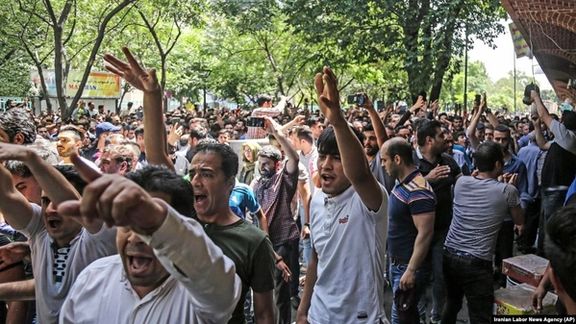
The people who considered themselves victorious in overthrowing the royal system were proud of this achievement. They lived in the empty dreams spun by revolutionaries, such as the promise of free water, electricity, and public buses, alongside ideals of spirituality and justice; they could have woken up after one or two years and Khomeini's picture would have no longer been visible on the moon – as was claimed by many in the early days of the revolution.
For this reason, it was necessary to drag the masses to the voting booths with stereotyped questions – and without wasting any time.
3. How did the different political groups react to this referendum?
Most political groups participated in the referendum and voted “yes”.
The Islamist groups fully participated in the referendum without any conditions and voted “yes”. Nationalist forces also participated and voted positively.
The vote of Mojahedin-e-Khalq (MEK) was positive but conditional. The Tudeh Party of Iran and other older communists voted “yes”, but the People's Fada’iyan and the Kurdistan Democratic Party boycotted the referendum.
Political groups enjoyed freedom of speech and press in the early months of the regime, before it had fully consolidated its power.
4. Was there any talk about the form of the new regime in the public sphere in the days preceding the referendum?
If you examine the press, news programs, and conversations in Iran before the referendum, you'll find no mention of guardianship of the jurist, Islamization, elimination of dissent, or compulsory hijab by the members of the Revolutionary Council, most of whom were clerics.
All of these discussions began during the drafting of the new constitution and the meetings of the Assembly of Experts to revise the draft.
The Iranian people were completely in the dark about what would happen to the governance system from February 11, 1979, to March 31, 1979.
5. Are the results of that referendum valid today?
In a system where only three referendums have been held in 45 years—namely, one referendum for creating the system and two referendums for the vote on the constitution (with a 99% positive vote and 85% participation in 1979) and its revision (with a 99% positive vote and 54% participation in 1989)—one cannot rely solely on the referendum for the legitimacy of a political system.
No referendum has been held for 35 years. Today, only less than ten percent of the country's population is over 63 years old, who were over 18 years old in 1979 and could vote then.
Today, the result of the referendum on the Islamic Republic has simply expired – even if it was reliable.

